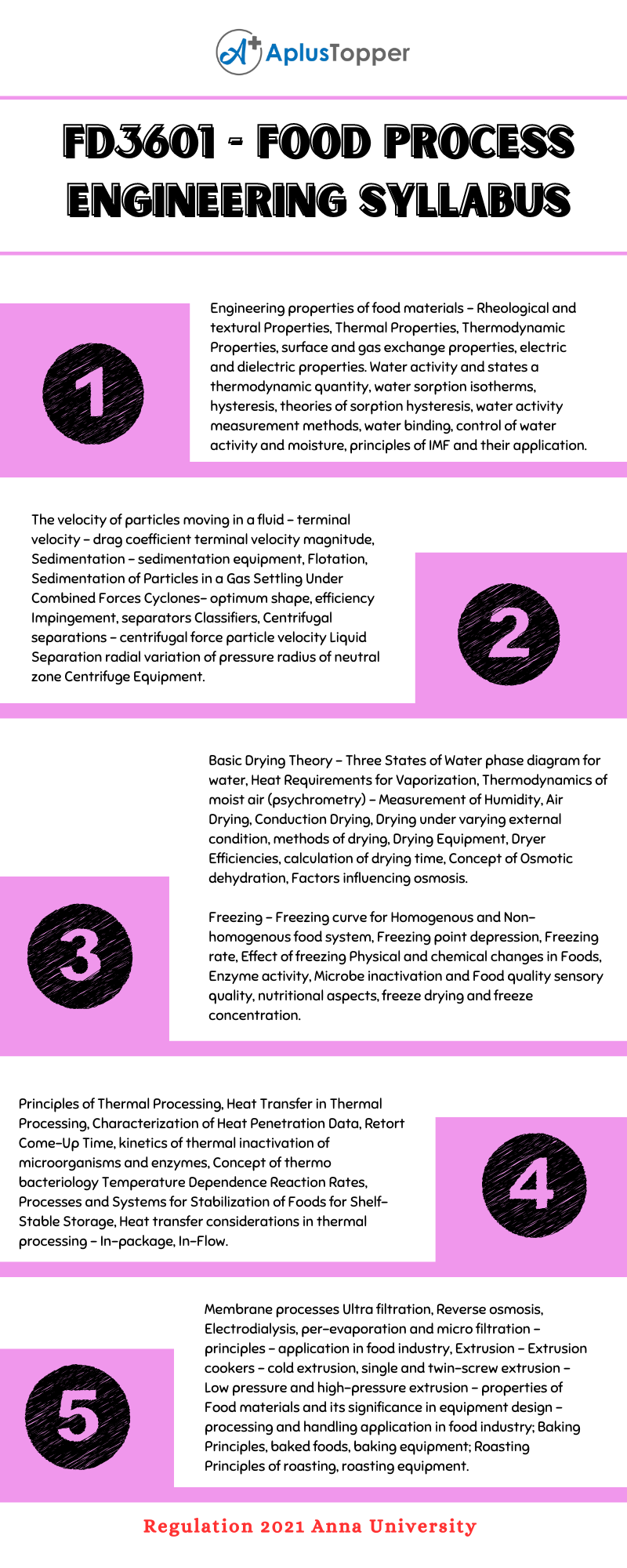FD3601 Subject code belongs to the Anna University, B.Tech Food Technology Semester VI syllabus. In this article, we discuss the syllabus of the Food Process Engineering subject. We hope it helps the students prepare for the academic exams.
The following article, FD3601 – Food Process Engineering Syllabus assists the students in thorough preparation for theory examinations. We include the detailed syllabus along with the expertise referred textbooks and references. Students can easily get information regarding the food process engineering syllabus, we add every concept to each unit. You can follow the information and prepare well if you have any doubts regarding the syllabus of this subject. You can comment below. Aplustopper.com will be available as soon as possible. Hope this information is useful. Don’t forget to share this information with your classmates.
If you want to know more about the syllabus of B.Tech Food Technology Syllabus connected to an affiliated institution’s four-year undergraduate degree program. We provide you with a detailed Year-wise, semester-wise, and Subject-wise syllabus in the following link B.Tech Food Technology Syllabus Anna University, Regulation 2021.
Aim Of Objectives:
The course aims to
- Understand the basic engineering properties of food.
- Understand different thermal and non-thermal processes used in the Food Industry.
FD3601 – Food Process Engineering Syllabus
Unit I: Properties Of Food
Engineering properties of food materials – Rheological and textural Properties, Thermal Properties, Thermodynamic Properties, surface and gas exchange properties, electric and dielectric properties. Water activity and states a thermodynamic quantity, water sorption isotherms, hysteresis, theories of sorption hysteresis, water activity measurement methods, water binding, control of water activity and moisture, principles of IMF and their application.
Unit II: Sedimentation And Centrifugation
The velocity of particles moving in a fluid – terminal velocity – drag coefficient terminal velocity magnitude, Sedimentation – sedimentation equipment, Flotation, Sedimentation of Particles in a Gas Settling Under Combined Forces Cyclones- optimum shape, efficiency Impingement, separators Classifiers, Centrifugal separations – centrifugal force particle velocity Liquid Separation radial variation of pressure radius of neutral zone Centrifuge Equipment.

Unit III: Drying And Freezing
Basic Drying Theory – Three States of Water phase diagram for water, Heat Requirements for Vaporization, Thermodynamics of moist air (psychrometry) – Measurement of Humidity, Air Drying, Conduction Drying, Drying under varying external condition, methods of drying, Drying Equipment, Dryer Efficiencies, calculation of drying time, Concept of Osmotic dehydration, Factors influencing osmosis.
Freezing – Freezing curve for Homogenous and Non-homogenous food system, Freezing point depression, Freezing rate, Effect of freezing Physical and chemical changes in Foods, Enzyme activity, Microbe inactivation and Food quality sensory quality, nutritional aspects, freeze-drying and freeze concentration.
Unit IV: Thermal Processing
Principles of Thermal Processing, Heat Transfer in Thermal Processing, Characterization of Heat Penetration Data, Retort Come-Up Time, kinetics of thermal inactivation of microorganisms and enzymes, Concept of thermo bacteriology Temperature Dependence Reaction Rates, Processes and Systems for Stabilization of Foods for Shelf-Stable Storage, Heat transfer considerations in thermal processing – In-package, In-Flow.
Unit V: Food Material Processing
Membrane processes Ultrafiltration, Reverse osmosis, Electrodialysis, per-evaporation and microfiltration – principles – application in food industry, Extrusion – Extrusion cookers – cold extrusion, single and twin-screw extrusion – Low pressure and high-pressure extrusion – properties of Food materials and its significance in equipment design – processing and handling application in food industry; Baking Principles, baked foods, baking equipment; Roasting Principles of roasting, roasting equipment.
Text Books:
- Toledo, Romeo T. “Fundamentals of Food Process Engineering” II Edition. CBS Publishers, 2000.
- Fellows, P J. “Food Processing Technology Principles and Practice”. 3rd Edition, Woodhead, 2009.
- Smith P. G “Introduction to Food Process Engineering”. Springer, 2005
- Earle, R.L, “Unit Operations in Food Processing”. Pergamon Press. Oxford. U.K, 2013.
References:
- Sahay, K. M. and K. K. Singh..“Unit operation of Agricultural Processing”, Vikas PublishingHouse Pvt. Ltd., New Delhi, 2004.
- Berk, Zeki. “Food Process Engineering and Technology”. Elsevier, 2009.
Related Posts On Semester – VI:
Must Read:
